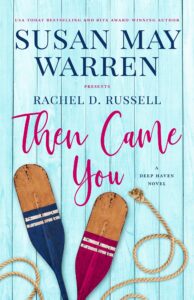by Rachel D. Russell, @RDRussellWrites

“Mom, what’s your question?” I interjected, as gently as possible, when she paused to take a breath. The light on my multi-line phone base had been blinking on and off for more than five minutes during her winding tale.
My boss, attempting to reach me. I gripped the receiver in my hand, trying to sort through the information my mom had just shared. Trying to figure out what she wanted to ask.
“Oh. Well…,” she said. Then silence.
Because she’d lost both me and herself in all the backstory of the dilemma she was facing.
Once she’d thought about it, she told me the question, and then I could pluck out what details were pertinent for me to know in order to answer her question—and then, get back to my boss, who still needed to talk to me.
It’s easy for it to happen in live conversation. We get caught up, uncertain what information our listener wants to know. We inadvertently say too much. Then we talk, ask and answer questions. Find resolution.
As writers, however, we don’t have an opportunity to engage in that back-and-forth discussion. The listener can’t redirect the speaker to focus on the true matter. Can’t point to the page and ask, “What do I need to know in all this?”
Nope.

So, how do we go about delivering the exact necessary details without swamping or burying the reader backstory?
- Less is more. Avoid information dumps. There’s a reason it’s often referred to as “breadcrumbs.” It’s not as a platter of breadsticks at your favorite Italian restaurant. Think of it as a melt-in-your-mouth taste, not bloat-your-belly gluttony.
- Create curiosity without confusion. Use hints strategically, where they make sense within the context of the current story. The backstory details should flow seamlessly where they are placed and not feel like an omniscient narrator, standing at the edge of the stage announcing information to the audience in a loud whisper.
- Every detail must matter. If you give too many details at once, your reader will skim or become overwhelmed. Don’t flood the reader with irrelevant details that don’t have a true bearing on the story. Everything must be relevant and add life to the page.
- Some of your backstory information will never make it onto the page. It might be inferred, implied, or simply knowledge the author has that is a facet of behind-the-scenes structure but never needs to appear on the page.
- Backstory, done right, is integral to a well-written story. It demonstrates how the characters came to be who they are through glimpses of the life each one lived prior to page one. Use it to reveal their motives and give substance to their emotional responses.
Your turn: Do you tend to write too much or too little back story?
He’s in Deep Haven to relax.
Detective Daniel “Boone” Buckam is more than burned out. After fourteen stellar years on the job, one bad judgment call—and, fine, a whole lot of cynicism—has forced him into a mandatory vacation. If he can get his head on straight, there’s a job as Police Chief waiting for him back in his Minneapolis suburb.
But then he meets Vivien.
Actress Vivien Calhoun isn’t really a drama queen. Sure, she gets swept up in the emotions of life—but please, she’s an actress. Or, um, was until a stalker made her flee the bright lights of Broadway. Now, she’s passionate about directing her local theater production. But when she accidentally ropes an uptight police detective on vacation into her cast, she can’t help but wonder if he might be the leading man she’s always longed for.
Of course, she’s in trouble.
Boone can’t help but like Vivien. He might even have a type—vivacious and bubbly, with a penchant for attracting danger. He can smell trouble even if she can’t, and is pretty sure her stalker has hunted her all the way to Deep Haven. He’ll have to stay by her side—even if it means being in her silly play—to keep her safe. But Vivien is more than he expected as she helps him discover a part of him he’s locked away…the part that said he could never love again.
So much for relaxing.

Rachel D. Russell writes contemporary inspirational romance focused on forgiveness, redemption, and grace. She’s a member of Oregon Christian Writers, American Christian Fiction Writers, and My Book Therapy’s Novel Academy. Her debut novel, Still the One, released in January 2021. Her second novel, Then Came You, released in July 2021. Both novels are part of the Deep Haven Collection with Sunrise Publishing. When Rachel’s not cantering her horse down the Oregon beaches, she’s probably interrogating her husband on his own military and law enforcement experience to craft believable heroes in uniform. The rest of her time is spent enjoying her active family, including two teens and three keyboard-hogging cats. You can catch up with her at RachelDRussell.com, Facebook, Twitter, and Instagram.

